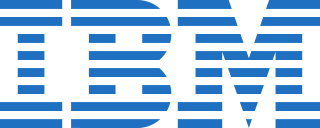IBM mainframes are large computer systems produced by IBM since 1952. During the 1960s and 1970s, IBM dominated the large computer market. Current mainframe computer in IBM's line of business computers are developments of the basic design of the IBM System/360.

IBM Db2, announced in 2017, is the successor name to the 1980s-introduced DB2.

VM is a family of IBM virtual machine operating systems used on IBM mainframes System/370, System/390, zSeries, System z and compatible systems, including the Hercules emulator for personal computers.
CP/CMS is a discontinued time-sharing operating system of the late 60s and early 70s, known for its excellent performance and advanced features. It had three distinct versions:
Quantum Corporation is a manufacturer of data storage devices and systems, including tape drive and disk-based systems. The company's headquarters is in San Jose, California. From its founding in 1980 until 2001, it was also a major disk storage manufacturer, and was based in Milpitas, California. Quantum sold its hard disk drive business to Maxtor in 2001 and now focuses on integrated storage systems.
Disk Operating System/360, also DOS/360, or simply DOS, is a discontinued operating system for IBM mainframes. It was announced by IBM on the last day of 1964, and it was first delivered in June 1966. In its time, DOS/360 was the most widely used operating system in the world.
IBM Spectrum Protect is a data protection platform that gives enterprises a single point of control and administration for backup and recovery. It is the flagship product in the IBM Spectrum Protect family.
SQL/DS, released in 1981, was IBM's first commercial relational-database management system. It implemented the SQL database-query language.
As of late 2006, IBM's Multiprise 3000, product number 7060, is physically the smallest mainframe, introduced in 1999 and still in common use. Models H50 and H70 were withdrawn from marketing in 2002. It uses a similar case as the S/390 Integrated Server, which was introduced about one year earlier. The Multiprise 3000 is unusual because it contains internal disk storage. Withdrawal of service for all models occurred at the end of 2012.
Since the rise of the personal computer in the 1980s, IBM and other vendors have created PC-based IBM-compatible mainframes which are compatible with the larger IBM mainframe computers. For a period of time PC-based mainframe-compatible systems had a lower price and did not require as much electricity or floor space. However, they sacrificed performance and were not as dependable as mainframe-class hardware. These products have been popular with mainframe developers, in education and training settings, for very small companies with non-critical processing, and in certain disaster relief roles.
ACF2 is a commercial, discretionary access control software security system developed for the MVS, VSE and VM IBM mainframe operating systems by SKK, Inc. Barry Schrager, Eberhard Klemens, and Scott Krueger combined to develop ACF2 at London Life Insurance in London, Ontario in 1978. The "2" was added to the ACF2 name by Cambridge Systems to differentiate it from the prototype, which was developed by Schrager and Klemens at the University of Illinois—the prototype name was ACF. The "2" also helped to distinguish the product from IBM's ACF/VTAM.
This article covers the History of CP/CMS — the historical context in which the IBM time-sharing virtual machine operating system was built.
Capex Corporation was a software house based in Phoenix, Arizona founded by three former employees of General Electric. It was acquired by Computer Associates International, Inc. in 1982.

M-Systems Ltd., was a Nasdaq-listed Israeli producer of flash memory storage products founded in 1989 by Dov Moran and based in Kfar Saba, Israel. They were best known for developing and patenting the first flash drive, marketed in 1995 as DiskOnChip, and the first USB flash drive, marketed in 2000 as DiskOnKey. They also created the patented True Flash Filing System (TrueFFS) which presented the flash memory as a disk drive to the computer. After 17 years of business, they were acquired by their prior competitor, SanDisk, in 2006. The DiskOnChip (DOC) was developed at the R&D Center established by M-Systems called EUROM. Rick Iorillo, Rony Levy and David Deitcher were the individuals that worked on the development and marketing of the first 2 MB DOC. This product went on to receive the Most Innovative Award from EDN in 1995 and later went on to become the Flash Drive and DiskOnKey.
The history of operating systems running on IBM mainframes is a notable chapter of history of mainframe operating systems, because of IBM's long-standing position as the world's largest hardware supplier of mainframe computers.
Virtue is a virtual session manager running under IBM's VM.
Westi was one of two early local teleprocessing packages for IBM's DOS/VSE environment. Westi stood for Westinghouse Terminal Interactive. Westi provided an interface and access method for programmers to 'talk' to monitors and handle data entry. Such access methods later became known as APIs and the handlers a form of transaction processing.
Tallgrass Technologies Corporation was the first manufacturer to offer a hard disk drive product for the IBM PC. Tallgrass was a Kansas City based microcomputer hardware and software company founded in December 1980 by David M. Allen. The hard disk drive product was initially sold in Computerland stores, alongside the original IBM PC. Tallgrass added tape-backup systems to its product line in 1982.








